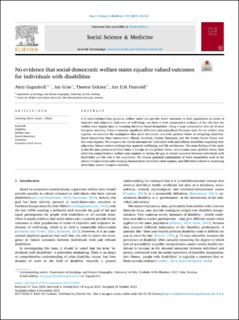| dc.contributor.author | Gugushvili, Alexi | |
| dc.contributor.author | Grue, Jan | |
| dc.contributor.author | Dokken, Therese | |
| dc.contributor.author | Finnvold, Jon Erik | |
| dc.date.accessioned | 2024-02-05T08:00:52Z | |
| dc.date.available | 2024-02-05T08:00:52Z | |
| dc.date.created | 2023-12-04T13:34:47Z | |
| dc.date.issued | 2023 | |
| dc.identifier.citation | Social Science and Medicine. 2023, 339 . | en_US |
| dc.identifier.issn | 0277-9536 | |
| dc.identifier.uri | https://hdl.handle.net/11250/3115423 | |
| dc.description.abstract | It is acknowledged that generous welfare states can provide better outcomes to their populations in terms of
objective and subjective indicators of well-being, yet there is little comparative evidence of the role that the
welfare state regime plays in lessening disability-based inequalities. Using a large comparative data set of most
European societies, Tukey’s honestly significant difference and generalized Hausman tests for six welfare state
regimes, we examine the assumption that social-democratic countries perform better in mitigating disability-
based inequalities than conservative, liberal, Southern, Eastern European, and the former Soviet Union wel-
fare state regimes. We compare the valued outcomes for individuals with and without disabilities regarding their
education, labour market participation, material well-being, and life satisfaction. The main finding of this study
is that the most generous welfare states in Europe do not perform better, and in some cases, perform worse, than
other less comprehensive welfare state regimes in closing the gap in valued outcomes between individuals with
disabilities and the rest of the population. We discuss potential explanations of these inequalities such as the
nature of expectations and changing characteristics of welfare state regimes, and difficulties related to measuring
disabilities across European societies. | en_US |
| dc.language.iso | eng | en_US |
| dc.rights | Navngivelse 4.0 Internasjonal | * |
| dc.rights.uri | http://creativecommons.org/licenses/by/4.0/deed.no | * |
| dc.title | No evidence that social-democratic welfare states equalize valued outcomes for individuals with disabilities | en_US |
| dc.type | Peer reviewed | en_US |
| dc.type | Journal article | en_US |
| dc.description.version | publishedVersion | en_US |
| cristin.ispublished | true | |
| cristin.fulltext | original | |
| cristin.qualitycode | 2 | |
| dc.identifier.doi | 10.1016/j.socscimed.2023.116361 | |
| dc.identifier.cristin | 2208513 | |
| dc.source.journal | Social Science and Medicine | en_US |
| dc.source.volume | 339 | en_US |
| dc.source.pagenumber | 0 | en_US |
| dc.relation.project | Norges forskningsråd: 312650 | en_US |

